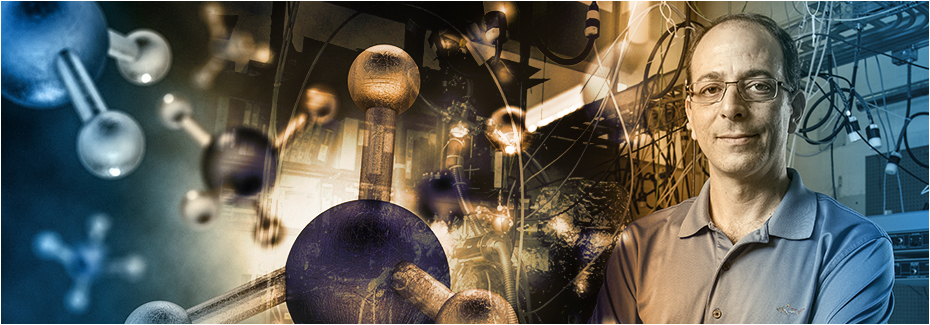UF chemical engineering professor Jason Weaver recently published a paper in Science on his novel, low-temperature method for activating methane – a precursor to a process with big implications.
Colorless, odorless and tasteless, methane could easily slip past you.
It’s one of the most abundant organic compounds on Earth, and by way of landfills and manure piles, we make more of it every day. It’s the main ingredient in natural gas. It’s also a greenhouse gas, in other words, it traps heat in our atmosphere before it starts to break down naturally. It is regularly utilized by industry in a cumbersome process called “steam reforming” to make synthesis gas (CO + H2) that is then used as a reactant to a variety of chemicals, including methanol. Even at an industrial scale, converting methane indirectly, at best into anything useful; is intensive, inefficient and costly, and directly, nonexistent. The reason? It’s a very stable molecule, and it’s very difficult to activate and controllably change its state.
But Jason Weaver is trying to change that.
“If you could directly convert methane to chemicals,” said Weaver, “it would have a tremendous impact on the chemical industry.”
Weaver, a professor of chemical engineering in the Herbert Wertheim College of Engineering at the University of Florida, has devoted his career to researching surface chemistry, in particular to understanding the significance of advanced oxidative processes on solid surfaces.
According to Weaver, in order for methane to break down, an initial cleavage of a carbon-hydrogen bond needs to happen. Subsequent reaction steps are then unlocked, and each one should be much easier.
“Like dominoes,” Weaver says. What needs to happen to improve catalytic processes, he said, is to achieve that initial cleavage with far less energy input. This is where iridium, a rare element, found in meteorites, comes into play. It is exceptionally dense and corrosion resistant. When Weaver and his collaborator and former colleague, Aravind Asthagiri, now of Ohio State University considered a quantum mechanics approach to the question, they mathematically determined that iridium would be an ideal oxidized material that can weaken the bonds of methane. The metal would bond to the methane molecule, thereby weakening the bonds. Oxygen would then bond with the hydrogen atom as a C-H bond breaks.
The process is arduous, even in a custom-built lab where oxides can be studied at near-atmospheric pressure so that the catalytic transformations of methane can be properly analyzed. But their effort paid off.
By last Christmas, Weaver and his students were effectively activating methane at very low temperatures. They reported their findings and they were recently published in Science.
There are still more dominoes that need to fall before Weaver can patent a commercially viable process for selectively oxidizing methane, but when that happens, it’s not hard to predict the enormous economic impact it would have. Petrochemical companies that would utilize the process can not only produce fuels, they can make plastics, polymers, paints, and all kinds of other chemical products, straight out of methane without relying on an otherwise expensive energy-intensive process. The savings on the production, combined with the unprecedented high volume of products thereon may just be disproportionately exponential.
“The potential economic impact to Jason’s research is matched or possibly exceeded by the prospective benefit to the environment,” said Forrest Masters, Associate Dean for Research in the Herbert Wertheim College of Engineering at UF. “Current technology wastes methane, which is a valuable source of carbon and hydrogen. His discovery can lead to a much better utilization of natural gas and other natural resources. We literally gain, by wasting. And this is not just mind-boggling, it’s truly transformational.”
Source: Herbert Wertheim College of Engineering
Contact: Jason Weaver, Professor, 352-392-0869, weaver@che.ufl.edu
